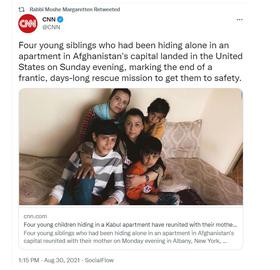Last August, just as many Americans were preoccupied with their summer holidays, the withdrawal of US forces from Afghanistan precipitated a human catastrophe: the rapid fall of the Afghan government and coming to power of the Taliban, a brutal terrorist organization now in charge of a country.
While the US and many other countries accelerated an official rescue program to evacuate tens of thousands of at-risk Afghans, many American civilians also tried to help on the ground as best they could. Some were linked to Afghanistan in unexpected ways.
For Rabbi Moshe Margaretten, of the non-profit Tzedek Association in Brooklyn, New York, it all started when he got calls about someone by the name of Zablon Simintov: an Afghan Jewish carpet trader who has been widely known, thanks to various media reports over the years, as Afghanistan’s last remaining Jew. “I was told he was in big danger,” Rabbi Margaretten told IranWire. “And I was asked if I could get US politicians involved to help him.”

Zablon Simintov, known as the last Jew in Afghanistan, on the plane departing his homeland
The 61-year-old Simintov ended up getting the help he needed and is now finally on his way to join his family, which includes two daughters, In Israel. Alongside the Israeli-American philanthropist Mordechai “Moti” Kahana, the Brooklyn rabbi helped to fund and organize the trip, which included getting Simintov to do something he had refused to do for years: divorce his wife, who lives in Israel, via a Zoom ceremony (Simintov was worried about the consequences of moving to Israel without the divorce.)
But the rabbi didn’t stop there. “I learnt about the situation in Afghanistan and I realized so many people’s lives are at risk,” he tells me. “I figured I wouldn’t sit idle. I would do what I could to help those people.”
Helping people comes naturally to the rabbi, whose Tzedek Association, first launched in 2009, has helped draft a bill on reform of the criminal justice system. More recently, the Tzedek Association has been busy transporting aid and equipment to hospitals during the coronavirus pandemic.
From Fiction to Rescuing a Family
Meanwhile, hundreds of kilometers to the west, in Chicago, a businessman well-known for his philanthropy work in the city’s Jewish community had his own reasons to connect to Afghanistan. His name was Jeff Aeder.
In 2013, Aeder and his wife, Jennifer Levine, were named Chicagoans of the Year for founding the city’s first college prep school for students with learning difficulties. Last year, long before the Taliban’s lightning-fast return to power, students at the Wolcott School got to know the country better as they read The Kite Runner: the first novel by bestselling Afghan-American author Khaled Hosseini.
“After reading The Kite Runner, the students were introduced to a young man named Ghaffur, who was a senior at a high school in Afghanistan,” Aeder tells me in a phone conversation from Chicago. “He talked to our students about the book, about being Hazara [an oppressed minority group in Afghanistan who follow Shia Islam], about his life in Afghanistan, what it was and what he was hoping it would be.”
The young man’s words stayed with Aeder. Then, about six weeks ago, he got an email from a teacher at Ghaffur’s school. Like many Afghans, his life was in danger: not least because his sister was a fierce advocate for women’s education and had started up multiple libraries in Kabul. “The teacher asked if I could get him out of Afghanistan,” Aeder says.
As a real estate businessman in Chicago, he had no clue how to rescue a family from Afghanistan. But he had heard about Moti Kahana’s work, and got in touch with him. Before long, Ghaffur and his family of seven were evacuated from Kabul to Mazar Sharif and finally into Pakistan.
Cries for Help Continue Apace
Meanwhile, in New York, Rabbi Margaretten had watched a story on CNN that wouldn’t leave him. It was the story of four children hiding from the Taliban in an apartment in Kabul. Their mother had left Afghanistan years earlier following her husband’s disappearance, and the kids were now living with relatives.
Margaretten contacted the CNN journalist who wrote the story on Twitter, but didn’t hear back. A week later, after a suicide bombing by ISIS near the gates of the Kabul airport killed dozens of fleeing Afghans, the rabbi kept thinking of those children. He was finally able to reach an attorney representing their family, and offered help. “She [the attorney] was skeptical at first,” the rabbi tells me. “She had had a lot of calls since the story got on the CNN, but none of them had come through.”

The four siblings were reunited with their mother in Albany, New York
But the rabbi was able to use the network he was building to get the kids on a flight to Qatar. Before long, they reunited with their mother in Albany, New York. His joy at seeing this happen was only matched by the frustration he felt as the cries for help piled up.
Meanwhile in Chicago, Aeder had heard of the Brooklyn rabbi helping people in Afghanistan and wanted to join in the effort. “I knew the rabbi had built up an amazing network of people in the region,” Aeder says. “I talked to him and to many of the great people he was working with at Tzedek. The whole team was excellent.”
Rabbi Margaretten can hardly hide his joy when he recounts the story of getting help from Aeder. While much of Tzedek’s base of support came from the generosity of New York’s Jewish community, Aeder was now able to draft in help from the third-biggest Jewish community in the United States, in Chicago. “A lot of my funds came from him [Aeder], who gave a lot of his own money and also did fundraising,” he says.
“Jewish Families Understand Persecution”
For both Margaretten and Aeder, there is a clear reason as to why themselves and their Jewish communities could connect to the plight of Afghans. “All my grandparents are Holocaust survivors,” the rabbi says. “From both my mother’s side and my father’s side. My grandfather lost eight kids in Auschwitz.”
After the Holocaust the family returned to Hungary, but the tumult of the country’s 1956 revolution prompted them to leave again. The rabbi grew up with stories of how his father, who was 10 years old at the time, had run through the forests of Austria in a group that also included his 8-month-old sister. “We see people who have gone through similar pain,” he says, “and it’s very touchy for us.”
With regard to Aeder, he adds: “He had the same philosophy as us: that Jews went through a similar situation and we now need to do whatever we can to help.”
Aeder adds: “The Jewish community in Chicago has been incredibly sympathetic to the plight of Afghans. I haven’t talked to anybody who hasn’t shown care. For the Jewish people, it’s an old story; persecution is something we are familiar with. A lot of families have lived through the Holocaust, and in more recent years, the horrors of antisemitism. They understand persecution and the terrible nature of random hatred.”
The plight of the Hazara people, who are at a much more heightened risk since the Taliban takeover, has attracted the community’s attention. “In the last few days,” the rabbi tells me, “I’ve been getting many, many messages from Hazara women. The other day a group of Hazara girls contacted me and said they were going to commit suicide unless I could take them out. I’m hoping I get them out very soon.”
Aeder also continues to gather support, including by organizing webinars in which people can hear those inside Afghanistan telling their stories. He hopes this will motivate communities in the US “to do everything they can to help.”
Those interested in helping Tzedek’s efforts can visit the website.